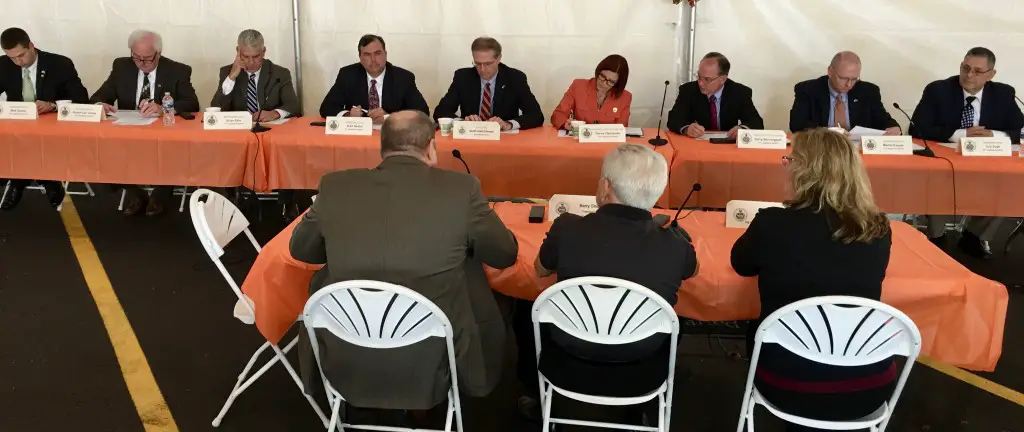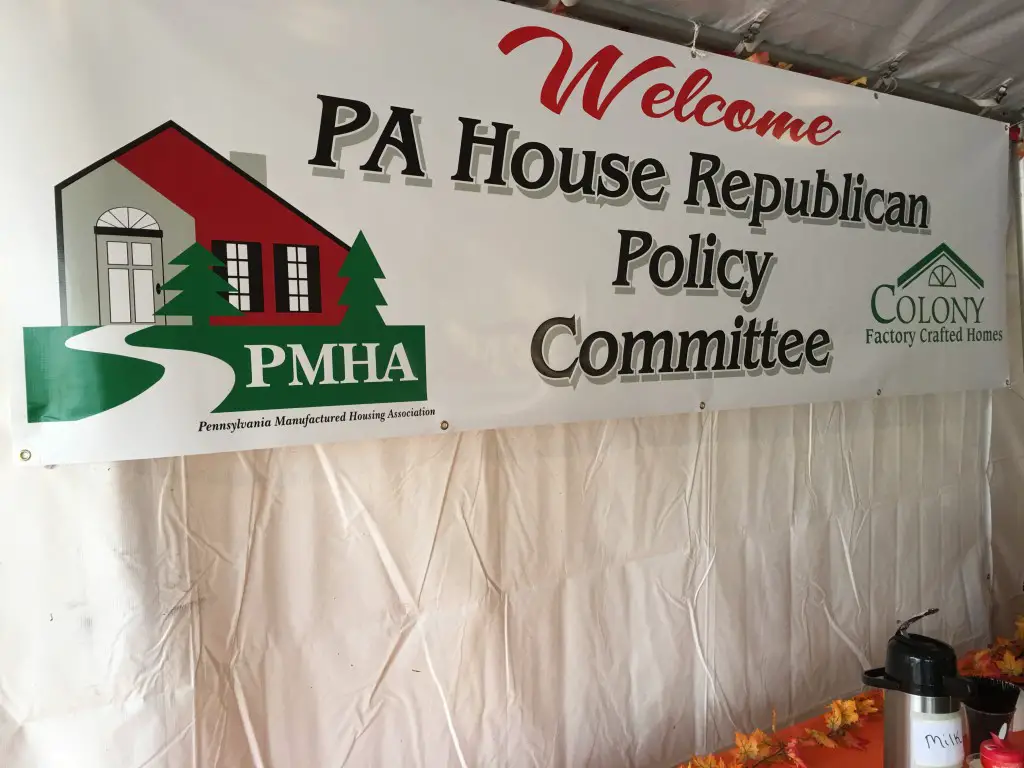
SHIPPENVILLE, Pa. (EYT) – A request to help the manufactured housing industry remain competitive was clear from those who testified at a state public hearing held by the Pennsylvania House of Representatives Republican Policy Committee at Colony Homes.
Barry Shein, owner of three manufacture housing facilities in the region, said the major way legislators can assist is making sure the industry can remain competitive.
“There is no question that Ohio and New York are aggressively going after jobs,” said Shein. “The costs are things you can’t control like Workers Compensation. You impact those laws, so it’s critical that we remain competitive in those areas with the other states.”
“It’s essential for us to go down the road with a wide load at a reasonable cost. We’re in Pennsylvania, and we recognize that we have road restrictions. It is also important that we don’t place too many restrictions on travel times. There are people fighting to limit the hours that we can travel, or limit the size of house we can ship, or have more transporting flag cars to travel with shipments.”
“We need you all to resist this kind of thing….The bottom line is our industry needs the support of government. We need the support for people to live in affordable homes, we need the support to build those homes and compete with these factories in other states.”

State Representative Donna Oberlander contacted Rep. Kerry Benninghoff, majority chairman of the House Policy Committee, to hold the meeting that was also attended by many other representatives, including R. Lee James (Venango County), Chris Dush (Jefferson County), and State Senator Scott Hutchinson.
Oberlander said the hearing was originally scheduled in April but was rescheduled due to travel restrictions.
“The real reason we’re having this hearing is to put the focus on how outstanding this industry is and how it impacts our region,” said Oberlander. “It is one of our largest employers as a cluster, and it’s so very important to our region. They are facing challenges with the building code, transportation costs, and other issues, so it’s a chance to shine the light on some of the issues and how the legislature can help.”
Providing testimony concerning an overview of the industry and current challenges were Mary Gaiski, Manufactured Housing Association; Barry Shein, Commodore Corporation; and John Fanelli, Riverview Homes, Inc.
Also testifying about the industry’s economic and local impact were Jill Foys, Northwest Commission; Wayne Brosius, Clarion County commissioner; and William Henry, III, a member of the Clarion County Economic Development Corporation and co-owner of Showcase Homes.
“It’s difficult to really explain how very important this is to our area,” said Oberlander “As a cluster, manufacture housing is one of our largest employer, but it also employs so many other businesses that offer products and services to this industry. My family has had a long history in manufactured housing, and I believe it is one of the most (important) things we have going on right now.”
Shein, president and CEO of the family-owned Commodore Corporation, explained the work of the three plants now operating in the area.
“We are building entry level housing all of the way up to retiree level,” said Shein. “The homes are designed and built with the idea of attracting people to stay in their homes and not move to apartments, but still have the option of affordable housing.”
Factory production creates jobs, and there are two types of homes built by Shein’s three factories, Colony Homes and neighbor Commodore Homes in Shippenville and Penn West in Emlenton (Butler County), just 22 miles away from Colony.
“We produce two types of homes, a HUD Code home and a Modular Code Home,” said Shein. “HUD is a nationally regulated home propagated by Washington, DC; the rules, the code, everything is done with inspection in the plant by national government inspectors. A Modular Code home is build to state and local codes, and it has exactly the same requirements. It’s inspected locally and built to the local code.”
A modular home is safe, and it’s not better or worse, according to Shein.
“The HUD Code and the Modular Code both conform to make a very safe and well-built home. The homes we build at Penn West generally sells to the customer somewhere between $150,000.00 and $200,000.00, so that’s a middle-income home. That would include a basement, a garage, a porch, a deck, and that’s the whole thing and not just the structure that we produce.”
“If you look to the HUD Code home, it generally is a lower cost per square cost, and you’re in the $90,000.00 to $125,000.00 part of the market. You can actually get a HUD code home equivalent to a modular home and option it to get up to $250,000.00. But, we’re not in the luxury housing.”
Shein explained that community home sites have leased land and is another type of housing that appeals to lower-income customers, and it is possible to buy a small, 1200 square foot home from one of Sheen’s factories for about $25,000.00. He estimated the end customer would pay double that, making it possible to buy a house you could live in – and not an apartment – and pay $50,000.00.
(This article is Part One of a two-part series on the manufactured housing industry in our region. Part Two will follow tomorrow.)
Copyright © 2024 EYT Media Group, Inc. All rights reserved. Any copying, redistribution or retransmission of the contents of this service without the express written consent of EYT Media Group, Inc. is expressly prohibited.








